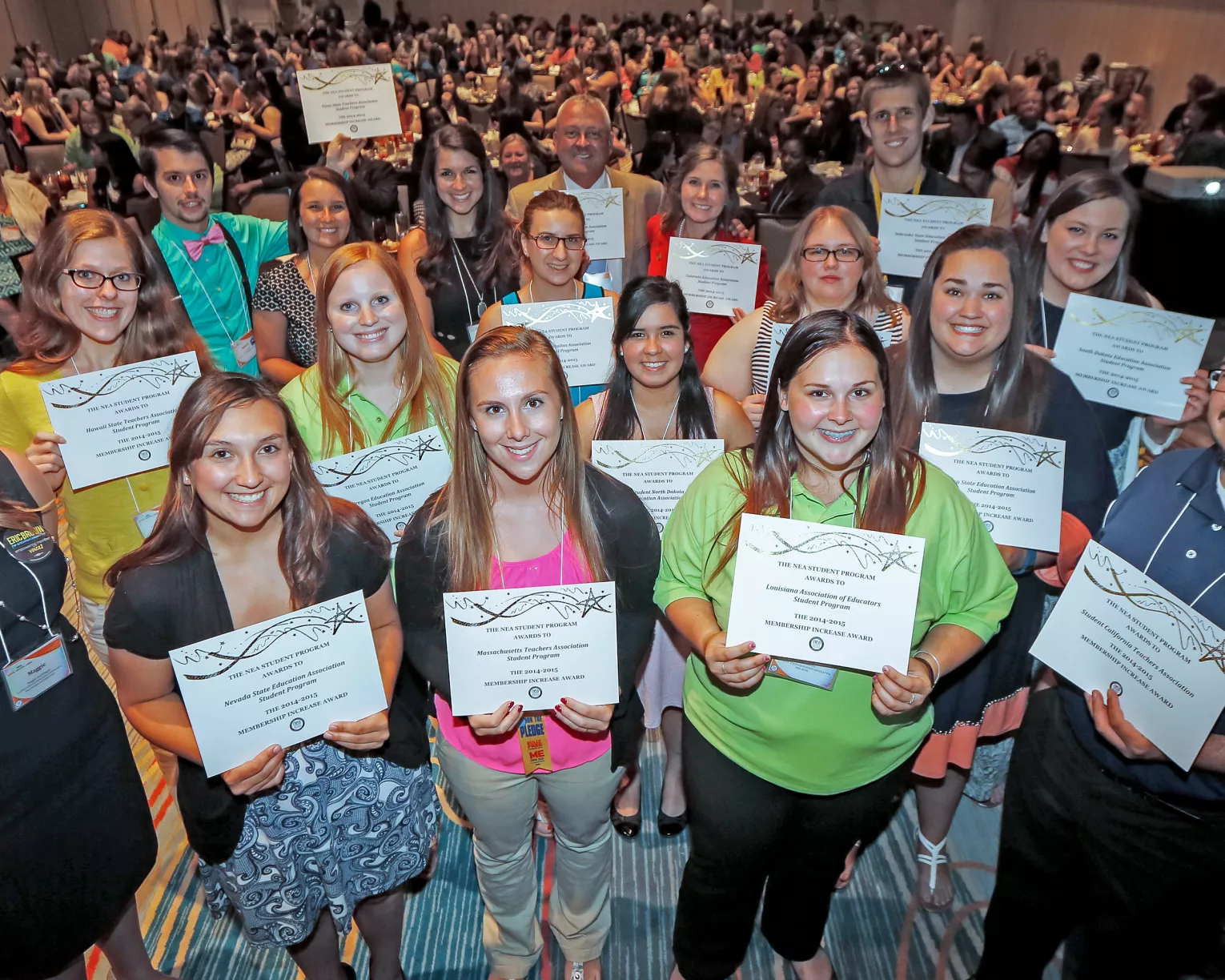The coronavirus has surged across many U.S. colleges and universities. At press time, the New York Times reported more than 320,000 cases at over 1,700 colleges and universities and at least 80 deaths. Members of NEA’s Aspiring Educators (AE) program immediately felt the disruption: dwindling coursework, campus life canceled, and student teaching cut short. And some felt the impact on their families, with relatives losing jobs, getting sick, or even dying. NEA Today spoke to four AE members who shared their experiences and how they persevered.
Meet Our Panel

What happened in the spring?
Roman Trejo: This all happened in a weekend. At the time, no one really took the coronavirus seriously. We were all like, “No huggiiiiing.” When the NEA leadership conference was canceled over health concerns, reality set in: This was not a joke.
Yesenie Cano: It started freaking me out, and it amazed me to see how some of the science teachers on campus were saying, “It’s a hoax.” Are you serious? This affects children and my future students. It affects so many people, and yet nobody was taking it seriously. When spring break came, everybody was told to stay home.
Hannah St. Clair: We received an email that our finals would be put online, and everyone should start making plans for the spring term to be potentially online. We weren’t prepared. I left all of my stuff in my dorm room and flew back to New York, where my parents live. My dorm room stuff was there until about mid-May.
Chamy Halliday: I was student teaching when it hit. How do you just go about your day knowing this is coming your way? The hardest part was that they cut student teaching by a week, and that’s all I had left to complete my program. They shut everything down, and I never got to say goodbye to the kids. It was really hard.
How did COVID-19 affect you?
CH: A week before quarantine went into effect, I did panic. My family was making fun of it, which made it worse. I needed somebody to take it seriously. I feel like I’m left to figure this out on my own. It’s been a lonely first year of teaching.
RT: When the first wave happened, my grandmother—who lived with me and was like my mother while my own mother was at work—died in April. She didn’t have COVID-19. She was on hospice, and because hospital resources had to be refocused to COVID-19, she had to leave the facility. We were told there was nothing they could do. She didn’t last very long. That was a huge shift for me.
The hardest part was that they cut student teaching by a week, and that’s all I had left to complete my program. They shut everything down, and I never got to say goodbye to the kids. It was really hard.
YC: I had one professor for three different math classes. He didn’t know how to work the online portion of class. He skipped a lot of chapters, too. It made the fall semester difficult because two of my math classes were crammed into eight weeks. It’s so much work. I’ve had to backtrack and learn everything I missed.
HS: I am an out-of-state student and really loved being in Oregon. When I was given the news of having an extended spring break, I was excited because I really missed my family back in New York. I was happy to be with them, but I definitely missed my friends and living on the West Coast. As a second-year student, I wanted to have that college independence back. I love the campus culture at the University of Oregon. I have a sense of belonging and a sense of community there. (Hannah returned to Oregon for the winter semester.)
How did your campus handle the pandemic?
YC: There was no communication until the first week of school in the fall. Nobody knew anything. I reached out to my advisor, who told me I would be on campus and socially distanced with four other people in my class. I worried about my band classes. I play the alto saxophone. How do younplay with a mask? My band director found a way for us to wear masks while we play. Under our seats, we have puppy training pads in case our saliva drips down. After class, we clean up, and then the next day we repeat the process.
HS: My university went mostly remote. Some classes are in-person. Those are mostly lab courses and small lab discussions. I do know most of those students were against going back on campus. They weren’t given virtual options, so if some people couldn’t go back to campus, then they were required to take their courses the next year and extend their degree by another year.

Where did you find support?
CH: I am in my master’s program. They’re on my side, and it’s great. The teachers I graduated with last spring have been a constant support group for me.
RT: I’ve leaned on my NEA family and AE peers. When my grandma died, all these people showed me their love. It’s the support I didn’t know I needed. I have friends here at home who I love dearly, but Aspiring Educators offer extra support in this professional space, and this means the world to me.
You might feel displaced. Everything feels awful, but you have this community of people who are just like you to share this space, especially leading up to the George Floyd protests. We needed this community because it cemented that not only are we together because of COVID-19, but we’re also together, standing arm in arm, because of Black Lives Matter.
YC: Aside from my family and friends, I found support through my work. I’m the math tutor for the Upward Bound program at the Hispanic Student Services on campus. The director is big on social and racial justice issues. We have a lot going on with the school administration. We’re the only Hispanic-serving institution in Oklahoma, and they haven’t been promoting that. This campus is so conservative, and coming to work and being able to talk to the director and other like-minded co-workers feels empowering.
HS: Our campus Aspiring Ed chapter went virtual, and we held biweekly meetings. I think that really helped to keep a sense of community. I wasn’t taking any education classes in the spring, but it was nice to have a space where I could talk about education issues and hear people talk about their experiences. I also have support through the national Aspiring Ed program,
which is a tight-knit group.
What would you like other AE members to know?
RT: While nobody wanted COVID-19 and racial unrest, we should see this as an opportunity to organize and build rapport among each other, so we can walk into whatever is going to happen next, together. We did that in April and May, when members of Aspiring Ed, along with some high school students who will become aspiring educators, created a food pantry for those affected by COVID-19. I don’t want anyone to think this is a time to stop. It’s a time to keep going and keep going faster.
CH: The book Fostering Resilient Learners: Strategies for Creating a Trauma-Sensitive Classroom talks about “concrete shoes.” As a teacher, you have to have your concrete shoes, so whatever comes your way, your foundation does not move. I think about the last several months, the huge change that’s occurred, and how teachers are amazing. Now more than ever, teachers who come into the field need to have those concrete shoes and know they are going into a profession that does and always will matter.
YC: Use your voice. When I started speaking up, people around me started speaking up as well. As future educators, we have to speak up for ourselves and students—and we need to do it for other people.




